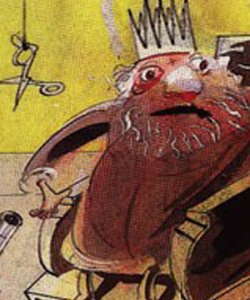Q&A: Briccetti’s Big Move Downtown
Executive director of Poets House Lee Briccetti talks about the relocation and expansion of the country's largest poetry library.
Jump to navigation Skip to content
Articles from Poet & Writers Magazine include material from the print edition plus exclusive online-only material.
Executive director of Poets House Lee Briccetti talks about the relocation and expansion of the country's largest poetry library.
Not unlike European explorers five hundred years ago, the United States publishing industry is looking for a route to China. And, like those explorers, each company seems to be setting a different course.

Taking cues from Letters to a Young Poet, published more than seventy years ago, the Letters to Poets project puts an updated spin on Rilke’s experiment in mentorship with organized correspondence between two distinct types of poets.
Last year a total of 172,000 books were published in the United States. Although that number reflects a 10 percent decrease from the previous year, it's easy to see how any one book could get lost in the shuffle—especially if it's one among the many memoirs being published every season. With the idea that there's strength in numbers, four memoirists who published books earlier this year have joined forces to promote their titles, developing a community of like-minded authors—and fostering emerging writers—along the way.

Art from Up Is Up, but So Is Down, a collection of writing and more than 125 photographs, book covers, and flyers that illustrate the dynamic, subversive work of the literary community known as "Downtown."
When fiction writer Barry Eisler heard last summer that Kepler's Books in Menlo Park, California, would close after fifty years in business, his first reaction was a loud expletive. His second was an e-mail to owner Clark Kepler with an offer to help. "I used to see those big author photos in the window…and I was working on what would become my first novel," says Eisler, the author of the Jain Rain series of thrillers. "My fantasies of literary success were all based on doing book signings at Kepler's."
This installment of Page One features excerpts from The Children's Hospital by Chris Adrian and American Genius: A Comedy by Lynne Tillman.

A decade after the founding of Cave Canem, Eady speaks about the ways in which the organization has developed into a "safe haven for black poets."
Literary MagNet chronicles the start-ups and closures, successes and failures, anniversaries and accolades, changes of editorship and special issues—in short, the news and trends—of literary magazines in America. This issue's MagNet features Ploughshares, Calyx, Gargoyle, and American Short Fiction.
Two weeks after he was chosen to succeed Ted Kooser as poet laureate, Donald Hall spoke about his newfound responsibilities.
Although Janet Fitch's Paint It Black, published this month by Little, Brown, is a work of fiction, the author drew inspiration from many genres, most notably poetry, while she was working on her follow-up to White Oleander.
Literary MagNet chronicles the start-ups and closures, successes and failures, anniversaries and accolades, changes of editorship and special issues—in short, the news and trends—of literary magazines in America. This issue's MagNet features the Paris Review, McSweeney's Quarterly Concern, the Iowa Review, and Speakeasy.
As the number of poetry readings in communities across the country continues to grow, a format that was once relatively rare—the marathon—is becoming increasingly popular.
Small Press Points highlights the happenings of the small press players. This issue features Seal Press and Bear Star Press.
Fueled by equal parts biodiesel gas and small press ambition, the Wave Books 2006 Poetry Bus Tour is scheduled to roll through forty-nine cities during the next two months, beginning in Seattle on September 4.
This installment of Page One features excerpts from The Exquisite by Laird Hunt and A Three Dog Life by Jack Pendarvis.

Workman Publishing imprint Black Dog and Leventhal reissues King Lear and Macbeth, the illustrated Shakespeare plays originally published in the 1980s—before graphic novels acquired a mainstream audience—as part of its Graphic Shakespeare series.
This installment of Page One features excerpts from Hillbilly Gothic: A Memoir of Madness and Motherhood by Adrienne Martini and The Yellow-Lighted Bookshop by Lewis Buzbee.
A computer programmer and former employee of Houghton Mifflin launches Library Thing, a Web site designed to re-create library-gazing online.
For the second installment of this occassional feature, in which we ask authors to list the movies,
music, artwork, and books that inspired them during the course of
writing their new books, we asked two-time Booker
Prize–winning author Peter Carey, whose ninth novel was published by
Knopf in May, for his list; he replied with this essay.

During her third month on the job, Jacobs spoke about her new position as executive director of the oldest independent publisher of women's writing in the world.
Poetry in America, the 2006 report released by the Poetry Foundation, has spurred efforts to revitalize an interest in poetry among the general population, and in doing so, has also sparked a debate among those in the literary community.
Literary MagNet chronicles the start-ups and closures, successes and failures, anniversaries and accolades, changes of editorship and special issues—in short, the news and trends—of literary magazines in America. This issue's MagNet features the Gettysburg Review, Prairie Schooner, Fence, Harpur Palate, Slate, and Ellipsis.
Penguin and the National Basketball Association (NBA) recently teamed up to launch a literacy campaign featuring the retired Earvin "Magic" Johnson, Ray Allen of the Seattle SuperSonics, Dwyane Wade of the Miami Heat, and Becky Hammon of the New York Liberty, a team in the Women's National Basketball Association.